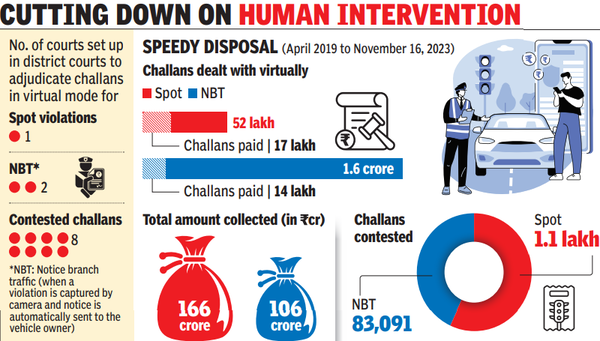Thanks to the digital ecosystem created by Delhi High Court, virtual hearingsare helping litigants follow their case proceedings.It is a concept aimed at eliminating the presence of litigants or lawyers in the court and adjudication of cases online. Meant for those who wish to pay the fine, contest thetraffic police notice or negotiate a settlement, these courts help in expediting cases with lesser resources but better efficiency.

Since April 2019 till mid-November this year, the 11 courts set up in Delhi to deal with virtual traffic challans have disposed of over 2.1 crore bookings.
Officials in the high court explained that the virtual court system was mooted by the e-committee of the Supreme Court to enable disposal of a traffic booking in a paperless manner and e-payment of the fine imposed. The court administration, in conjunction with Delhi Traffic Police, prepared a module that sends an SMS intimation of a challan for a traffic offence to the offender, who then has the option to either pay the fine online or exercise the option of contesting the notice.
If the violator chooses to plead guilty, the person is redirected to an e-payment gateway. In case the challan is contested, the matter is sent automatically to the traffic court concerned for disposal.
In virtual traffic courts, the fine is imposed or waived off by the presiding officers as per the Motor Vehicles Act. Violators can pay the fine online without visiting the court.
However, the facility is not to be confused with the traffic lok adalat conducted by the Delhi Legal Service Authority where a fine amount can be reduced or waived off, but for which the violator needs to be present physically. The online courts aim to make the proceedings easier for those who wish to contest the booking or pay the fine.
A link for the virtual courts is available on the website of the district courts to enable a violator to appear online on www.vcourts.gov.in. The violator is also notified about the hearing date and details of the digital traffic court.
Officials connected with the setup explained that a violator can place documents, make submissions or give evidence in a virtual court. If the court imposes a fine, it can be paid online without having to go to a physical court. For several offences under the MV Act, both the driver and owner are booked together. The virtual court appearance helps save time as neither driver nor owner have to keep time aside for a physical presence at the court.
“It is the most convenient way to get the challans disposed of without unnecessary hassles and harassment. It also saves the precious judicial time in respect of petty traffic challans,” the high court had earlier said. Lawyer Rajat Katyal added, “There is a high footfall in courts every day and litigants are stressed by the court appearances. At least such a crowd of hassled people don’t have to come to court physically on a given day because of virtual courts. It is a big convenience for them and also reduces pressure on courts.”
While physical traffic courts need five secretarial staff to deal with cases, at present only one judge with one staff are working in each virtual court. While this does economise in terms of human resources and expenditure, sources did say that digital courts are often being shared between four judicial officers. So, challenges remain.
For instance, images of the offending vehicle often do not reflect in the system of the judge in virtual courts. Such glitches are being rectified now. The system has also been upgraded to show in real time the fine amount paid by the violator through the online portal against the challans enabling the court to keep a track of total fines pending before settlement.
Due to the large number of traffic bookings made in a vehicle-heavy city like Delhi, dedicated servers meant for virtual hearings have been upgraded from time to time. Sources say that the high court’s information technology committee, headed by Justice Rajiv Shakdher, wants creation of such digital traffic courts in each district court of Delhi. The committee has also recommended digital courts for appeals and revisions.
In April, while inaugurating the digital traffic courts, Chief Justice of India DY Chandrachud had applauded the effort and stressed on the need to make virtual hearings facility across courts in Delhi a permanent feature.
#Delhi #Traffic #News #traffic #challan #Dont #fret #settle #virtually #Delhi #News

Leave a Reply